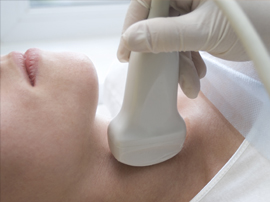The thyroid is a butterfly-shaped gland that straddles the windpipe. It produces thyroid hormone, which regulates your metabolism. An overactive thyroid puts your body into overdrive — your heart beats too fast, you can become shaky, and you may get diarrhea. This condition is called hyperthyroidism.
On the other hand, if you have too little thyroid hormone (called hypothyroidism), your heart rate slows, you may feel depressed, and also become constipated and retain fluid.
These conditions also have consequences for your heart. Either too much or too little thyroid hormone can result in high blood pressure and/or heart failure. Hypothyroidism also causes cholesterol to go up, increasing heart disease risk.
Hypothyroidism is the more common of these two maladies, especially in women age 60 and over. According to Dr. Chauncey Crandall, some of the most likely symptoms include:
- Sluggishness
- Unexplained weight gain
- Cold sensitivity
- Dry skin
- Thinning hair
- Hoarseness
Testing for hypothyroidism can be confusing. There are three different types of thyroid hormone, but generally thyroid stimulating hormone (TSH), which is secreted by the pituitary gland, is the primary screening measure in most situations.
The normal range for TSH is usually reported to be 0.4 to 4.0 mIU/L. However, other ranges go as wide as 0.3 to 5.5 mIU/L. Each laboratory and test manufacturer identifies its own normal TSH range.
In the past, these ranges were actually broader, but they were tightened in 2002 after the American Association of Clinical Endocrinologists declared that too many people were going undiagnosed and untreated. Since then, the association has proposed a range of 0.3 to 3.0 as “normal”, saying that too many people, particularly the elderly, are still being missed.
If you believe you may have a low-functioning thyroid gland, or if you have high cholesterol or high blood pressure for no known reason (especially if your blood pressure is difficult to control), ask your doctor for a thyroid test. If your TSH results fall near the high or low end of normal, or if you are convinced you have a thyroid disorder, consider seeing an endocrinologist for further evaluation.
There are supplements you can purchase to help support your thyroid function. If you want to try such a product, make sure that it contains both T3 and T4, which are the different components of thyroid hormone.
As important as they are, hormones are only part of the equation for good heart health. The other steps you take to reverse heart disease, like managing your blood pressure, lowering your cholesterol, preventing diabetes, and staying lean and active, remain key to keeping your heart healthy.
Still, if you want your body to work with peak efficiency, pay attention to your hormones.

